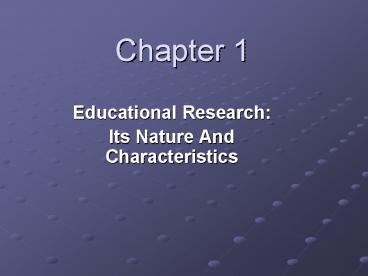Educational Research: - PowerPoint PPT Presentation
1 / 13
Title:
Educational Research:
Description:
What would I really LIKE to do for my study? What will I really BE ABLE to do for my study? ... Appropriateness of instrument for purpose of measurement ... – PowerPoint PPT presentation
Number of Views:951
Avg rating:3.0/5.0
Title: Educational Research:
1
Chapter 1
- Educational Research
- Its Nature And Characteristics
2
The Big Decision . . .
What will I really BE ABLE to do for my study?
What would I really LIKE to do for my study?
3
The Big Answer . . .
- Confer with your advisor and your committee
4
Educational Research
- is empirical
- should be systematic
- should be valid
- should be reliable
- takes a variety of forms
5
Systematic Process of Research
Identify the problem
Review the information
Collect the data
Analyze the data
Draw conclusions
6
Validity Reliability
7
Basic vs. Applied Research
- BASIC
- Conducted to add to the existing body of
knowledge in the discipline - Misconceptions
- complex design
- abstract impractical
- thinkers
- precise exacting
- no practical value
- APPLIED
- Conducted to solve an immediate and/or practical
problem - Misconceptions
- simple design
- unsophisticated
- practitioners
- sloppy haphazard
- great practical value
8
Qualitative vs. Quantitative
- understand social phenomena
- inductive
- context-specific
- facts values intrinsically mixed
- researcher takes active role in the situation
- determine effects, causes, relationships
- deductive
- context-free
- separate facts from values
- researcher acts as passive observer in the
situation
9
Qualitative vs. Quantitative (cont.)
- relies upon holistic interpretation
- human behavior dependent upon physical social
environment - employs more descriptive and interpretive
- methodology
- focus on individual variables and factors
- human behavior independent of physical
- social environment
- employs standardized research and statistical
methodology
10
Qualitative Methodology
- Conducted for the purpose of understanding social
phenomena - Historical studying a problem in the past that
requires collecting information and artifacts
about past events - Ethnographic describing and understanding a
cultural or social group - Case Study developing an in-depth analysis or a
single or multiple cases - Phenomenology understanding the essence of
experiences about a phenomenon - Grounded Theory developing a theory grounded in
data from the field
11
Quantitative Methodology
- Conducted to determine relationships, effects,
and causes - Experimental manipulating a variable
(experimental variable) to determine the effects
of the variation - Quasi-experimental similar to experimental
research but utilizing intact (rather than
randomly assigned) groups - Causal-comparative establishing
cause-and-effect relationships between groups
using pre-existing data - Correlational identifying the degree to which a
relationship exists between groups - Survey research dealing with the incidence,
distribution, and relationships of educational,
psychological, and sociological variables
12
Qualitative Quantitative Continuum
Historical
Grounded Theory
Case Study
Phenomenology
Ethnography
Survey Research
Correlational
Causal-Comparative
Quasi-Experimental
Experimental
13
Purposes for Research
- Educational research is directed toward
- the extension of knowledge
- and/or
- the solution of a problem































